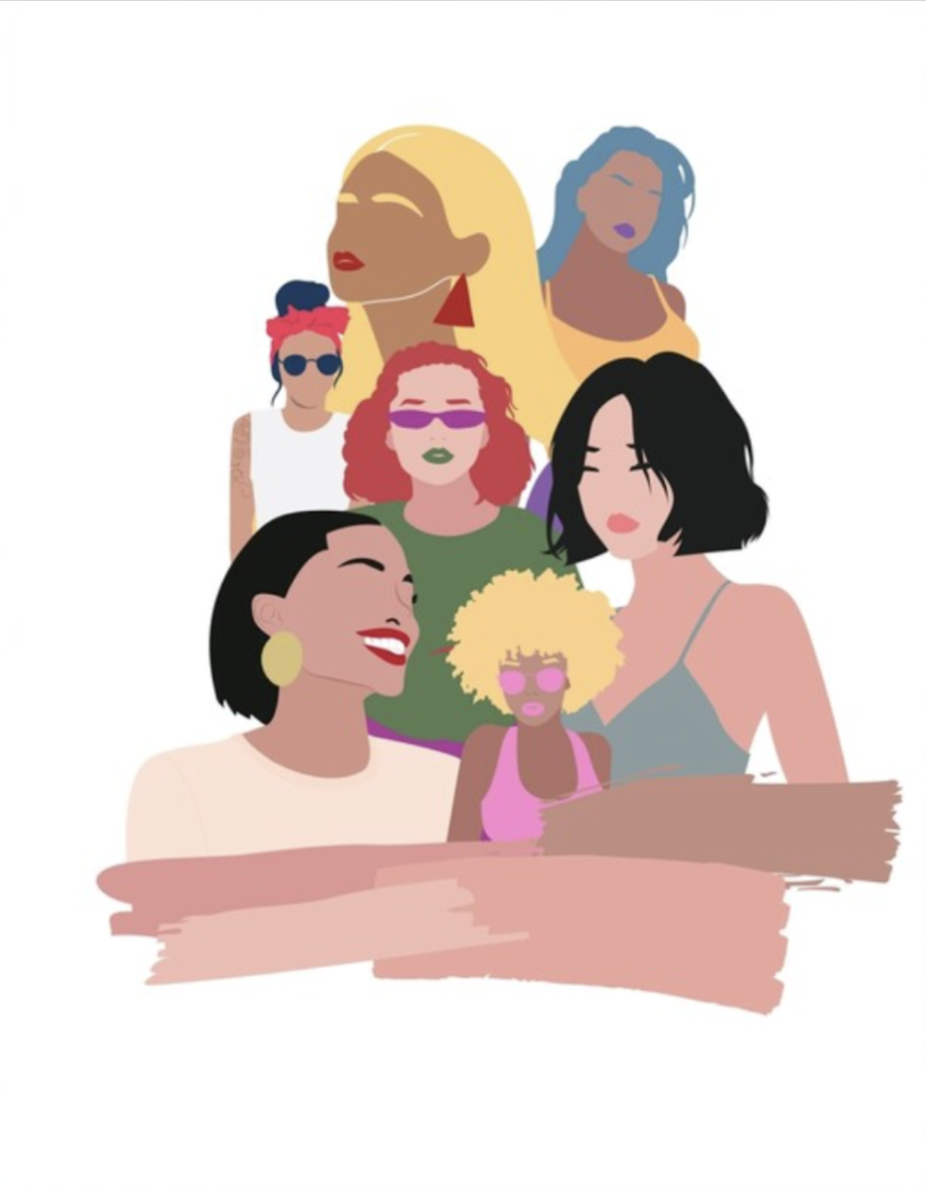Transitions to Girlhood and the Path to Womanhood
I remember the beautiful canvas of paint that was girlhood. It was full of soothing strokes of precious colors and memories, the canvas was mainly blank and I felt I could draw on it carelessly. There was no shame or preoccupation surrounding where my brush was going. However, one day, the paintbrush turned around and stabbed us with the first painful jab of womanhood, making the canvas bleed red, red, red.
Girlhood:
Girlhood, since that day, has gone from being told “he’s only picking on you because he likes you” to the normalization of toxic relationships and standards. It ranges from “I need two strong boys to help me carry these seats” to the assumption and weight of the stereotype that men were the masculine and therefore stronger, powerful and more ambitious. It went from being told, “she is only doing that because she’s jealous of you” to pitting myself against all my female friends. Girlhood went from wearing sports clothes because jeans were uncomfortable, to finding comfort in looking good even if the consequences were painful. As soon as that canvas stained red, we all learned the weight of the word “too”. Too skinny, too fat, too smart, too dumb, too feminine, too masculine, too confident, too weak. The word reflected the living oxymoron that was womanhood. Phrases like “where did my happy little girl go?” makes you yearn for that bittersweet nostalgia that was girlhood. Free of the ‘embarrassment’ of sweat stains, the ‘awkwardness’ of towering over guys, and the text of “I got home safe”. “Where did my happy little girl go?”, reminds you, you miss that little girl, and a time when chocolate tasted sweet and not like calories, too. I remember that warm embrace that girlhood offered. It blinded us to a world full of judgment, hatred, jealousy, and the terrifying world we would soon be shoved into. But before I knew it, the world whose warm embrace I had sought comfort from had pulled the blinds.
I had dreamed of a world with soulmates, picnic dates, and sunsets, only to be woken up by scrolling on messages that included: ‘do you send nudes?’ ‘I want a girl with an ass’ and ‘she’s a slut’. My phone scrolls towards feminist messages told me, “never let a man open the door for you.” I didn’t quite wrap my head around any of this. I needed to be skinny but not anorexic, healthy but not fat. Have confidence in my body, but not enough that I showed it off. Being in a healthy relationship was boring and we romanticized toxic ones.
I remember a time when the presence of males didn’t make me feel uncomfortable. A time when a touch didn’t mean something sexual, a joke was just funny, and not only because a male had said it, and I was free of the need for constant validation and approval. As a little girl, I was liberated of male validation when I ran, made a joke, commented on my interests, or made a change in my appearance. And you know why that is? Because my source of confidence came mainly from my parents and school. That sense of security in yourself is lost in womanhood, as are the many affirmations you used to get, and they are so crucial to a girl’s confidence. As kids, we can’t measure our qualities because we do not know enough about the world yet, so our parents usually take charge. As a girl, I thought I was beautiful, fast, smart, mature, and athletic because I was told these things by my parents.
Once we transition into womanhood, certain standards for women measure girls on their ability to do anything. This is when male validation kicks in, which isn’t powerful until we can become sexualized. Once previous sources of affirmations turn off, our brains subconsciously look for another form of validation, and unfortunately, we pick our most toxic option. Now, when I talk about male validation, I am not simply talking about romantic approval, but male approval that is rooted systematically in the lives of women. As soon as we reach girlhood we are measured on our beauty, and defined by society’s paradigm of the ideal woman. Women now need to be successful and/or pretty. If you are not one of these two things, you are considered a failure. In viewing womanhood, girlhood begins to understand the highlighted importance for men wanting to date you, marry you, and have sex with you.
I don’t think society quite understands the impact of being sexualized. It creates very superficial relationships amongst girls and between girls and boys. The fantasies, the insecurities about your looks, and the pressure of complying to the common standard begins to dominate. All these things become incredibly important, and they reduce your existence to only the sexual part of being human. To clarify, there are countless reasons being ‘dateable’ is positive, but these qualities should be important on a human level, not solely determined by men or the sexual approval of someone else. Qualities that make a person special should apply to all scenarios not only roamntci and should be admired but on a individual purpose. These doubts shouldn’t consume your thoughts and actions on a daily basis. In adulthood, men’s approval systematically overreaches into the psyche of women. Do men want to hire you? Will men allow you to have social mobility? Will they ‘allow’ us to walk down the street unbothered? Will he honor my right to safety? The biological physical superiority men hold influences our lives as soon as we become women. It can immobilize us sometimes.
The most confounding part of this phenomena is that targeted blame towards females comes from both women and men. Scroll through a few TikTok reels and it is clear society shames and blames us for our superficiality. After being measured on sexual grounds, society wonders why we care about, supposedly,the only thing that our success is determined by. In Barbie, Greta Gerwig captured the struggle of women and the feeling of being distraught if we weren’t beautiful or very successful. In emphasizing Barbie’s role in the movie, Gerwig reflected the cloud of uncertainty that surrounds simply being who we are, in simply being ‘Barbie’. Our happiness is measured by success or looks, yet the joy in living should simply be living. There are no real suppositions in life. Happiness and success have different definitions in everyone’s dictionary. Why should we comply to the ones produced by our current society?
Some argue that the ‘need’ for feminism has been extinguished. This perspective not only overlooks the countless rights that women lack outside of the Western world, it also fails to understand how our patriarchal society continues to impact females in ‘progressive’ countries. Currently, once the canvas of our lives stains red, we females are unsure about where we can paint and how we look doing so.
It is important we return to and conserve the many positive aspects of girlhood and learn to support each other, because females also subconsciously form part of the vicious cycle that works against us socially. At the end of the day, no one will remember how beautiful you were based on what Rare Beauty blush you wore, what top you chose to wear, or what lipstick shade you put on. Beauty will be remembered based on our kindness, support, rigor, and hard work. Let us create the adult canvas in which we embrace the freedom to enjoy each other and our existence. As women, let’s get together and blast music in the car, share that story, win the league, paint our nails, and reach our goals. Enough of grouping girls into categories, determining them by their subjective value, and pitting us against each other for the validation of a man. Let’s return to the affirmations and safety we used to get as girls which made our eyes twinkle and our hearts swell with joy. Remember we are the reason that our canvas lives, so let’s make it easier for us to paint all the colors on the canvas of our complex, beautiful true selves.
Source Cited:
KLADYSOON. “Womanhood.” Redbubble, www.redbubble.com/i/poster/83373050.E40HW. Accessed 19 Dec. 2023.

